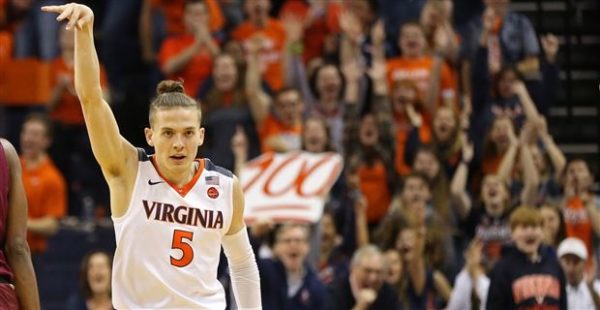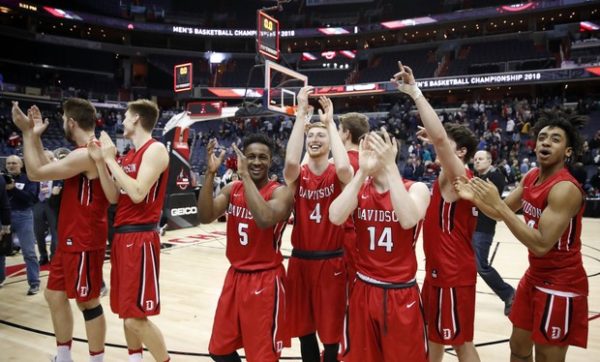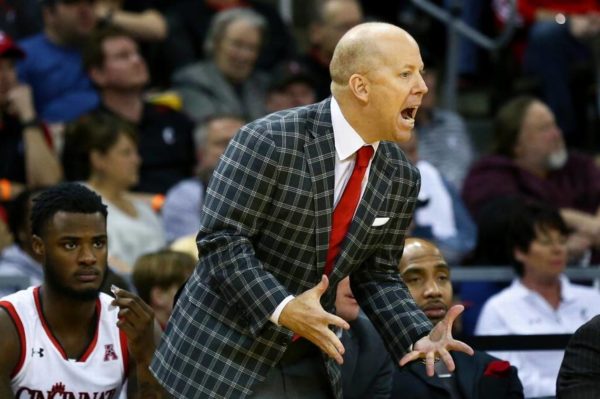RTC Bracket Prep: South Region
Posted by Tommy Lemoine on March 13th, 2018Yesterday and today we will be rolling out our region-by-region analysis for the 2018 NCAA Tournament. Here, Tommy Lemoine (@hoopthink) breaks down the South Region from top to bottom. Also, be sure to follow our RTC South Region handle on Twitter for continuous updates the next two weeks (@RTCSouthRegion).
South Region
Favorite: #1 Virginia (31-2, 17-1 ACC). Oh, how far Virginia has come. After beginning the season outside of both the AP and USA Today/Coaches Poll Top 25, the Cavaliers have won a school-record 31 games en route to the the #1 overall seed on Selection Sunday. In the process, they posted the second-best adjusted defensive efficiency mark in the KenPom era and didn’t allow a single opponent to break 70 points. This is also Tony Bennett’s second-most efficient offensive team since arriving in Charlottesville in 2009, thanks in large part to sharpshooter Kyle Guy (14.1 PPG, 39.5% 3FG). The notion that Virginia would be overwhelmed by Kentucky or Arizona’s athleticism seems particularly far-fetched considering that the Cavaliers beat Duke in Cameron Indoor Stadium and handled North Carolina twice this season. The idea that a stout defensive club like Cincinnati or Tennessee would out-grind the ACC champs seems equally questionable. Virginia is the South Region favorite, and there’s no really no argument otherwise.

Kyle Guy and the Cavaliers are the best bet to reach San Antonio. (Photo: Geoff Burke, USA TODAY Sports)
Should They Falter: #2 Cincinnati (30-4, 16-2 AAC). Were it not for Virginia, Cincinnati’s defense would have probably received a lot more national recognition this season. The Bearcats held opponents to just over 0.86 points per possession, a mark which — not adjusting for competition — hasn’t been topped since 2008-09 Memphis. Mick Cronin’s team is tough in every sense of the word, just as willing to pound the offensive glass (third nationally in Offensive Rebounding rate) as it is to grind opponents down on the other end. In senior Gary Clarke (13.0 PPG, 8.5 RPG), Cincinnati has a player who manages to serve as both its star and its “glue guy,” the type of scrappy weapon you want on your team when the game’s on the line in March. The Bearcats don’t have many great wins this season, but fresh off of beating Wichita State on the road and winning the AAC title, Cronin’s team looks primed for a deep March run.
Grossly Overseeded: #8 Creighton (21-11, 10-8 Big East). While the seeding was fairly well done in this region, Creighton’s landing spot at #8 came as quite the surprise. Most bracketologists had pegged the Bluejays as a #9 or #10 seed, with some placing them as low as a #11. Its home win over Villanova notwithstanding, Creighton finished just 1-9 against Quadrant 1 opponents this season and failed to win a single road game against teams that finished above .500. Then again, perhaps the Bluejays actually got a raw deal when you consider that instead of a possible Second Round matchup against #2 Cincinnati, they’ll have to face Virginia.
Criminally Underseeded: #13 Buffalo (26-8, 15-3 MAC). According to BracketMatrix.com, the vast majority of projections had atabbed Buffalo as a #12 seed (average: 12.08). Instead, the 26-win Bulls were given a #13 seed and tasked with handling future #1-overall NBA Draft pick DeAndre Ayton way out in Boise. And if you think seeding at this level doesn’t matter, consider this: Historically, #12 seeds have a 35.6 percent chance of advancing to the Second Round compared with just 19.7 percent for #13 seeds.
Sweet Sixteen Sleeper (#12 or lower): #12 Davidson (22-11, 13-5 Atlantic 10). Kentucky’s defense better be prepared on Thursday evening or the glow from that SEC championship will fade very quickly. Davidson is one of the premier offensive teams in the country, ranking 18th nationally in offensive efficiency thanks to mastermind head coach Bob McKillop and a roster chock full of excellent perimeter shooters (39.1% 3FG). McKillop’s free-flowing motion offense is a thing of beauty, predicated on great floor spacing, ball reversal and attacking open space to draw defenders out of position. Senior forward Peyton Aldridge (21.5 PPG, 7.8 RPG) is probably among the most underrated players in the country, while freshman Kellan Grady (18 PPG) has March star written all over him. KenPom gives Davidson a 37 percent chance to beat Kentucky in Boise, so don’t be surprised if McKillop’s team shoots itself all the way to Atlanta.
Final Four Sleeper (#4 or lower): #5 Kentucky (24-10, 10-8 SEC). That’s right — just as Davidson’s a sleeper in this region, so too is Kentucky, which enters the NCAA Tournament playing its best basketball yet. For perhaps the first time this season, the Wildcats’ freshman-loaded roster finally began realizing its talent during the SEC Tournament, shutting down Alabama on the defensive end before flexing its offensive muscle in the championship game against Tennessee. When point guard Shai Gilgeous-Alexander plays the way he did against the Volunteers (29 points on 10-of-16 shooting) and Wenyen Gabriel is knocking down shots from the perimeter (7-of-7 threes against Alabama), Kentucky looks capable of reaching San Antonio. Enough talent is certainly there, and John Calipari has made deep runs with underachieving teams before.

Davidson could give Kentucky some serious trouble. (Syracuse.com)
Carmelo Anthony Award: DeAndre Ayton, Arizona (20.3 PPG, 11.5 RPG). No player in college basketball is as physically dominant or visibly talented as the freshman Ayton, who made UCLA and USC look like high school rosters during the Pac-12 Tournament (32 points apiece). When Ayton wants a rebound, he gets it, and it’s somewhat surprising that the Wildcats don’t just lob it up for Ayton around the rim every time down the floor. And despite standing 7’1″ with the muscles of a 30-year-old, Ayton’s jump shot is remarkably smooth and rangy. The soon-to-be #1 overall NBA Draft pick makes Arizona another sleeper Final Four contender.
Stephen Curry Award: Caleb Martin, Nevada (19.1 PPG, 5.3 RPG). Caleb’s twin brother, Cody (13.6 PPG), is excellent in his own right, but it’s Caleb Martin who makes Nevada’s high-powered offense hum. The NC State transfer shot 41 percent from behind the arc this season on 218 attempts, flashing an ability to create his own shot and utilize his size to get to the rim. Few non-power conference players possess Martin’s combination of size, length and ball skills, which is why the Wolfpack should put up some points against Texas’ stingy defense
Home Cooking: None. Both #1 Virginia and #2 Cincinnati have to travel exactly 272 miles to their opening round locations, which means neither has a real advantage here. If anyone lucked out, in fact, perhaps it is #15 seed Georgia State, which has a shorter trip from Atlanta to Nashville than the Bearcats.
Can’t Miss First Round Game: #5 Kentucky vs. #12 Davidson, Thursday 3/15 at 7:10 PM ET. A one-and-done Goliath versus a perennial David. Size and athleticism versus system and style. Two of the best coaches in the sport. Not only does this game feature the beloved NCAA Tournament narratives, it also features two really good teams — both ranked inside the KenPom top 50 — that should go toe-to-toe in Boise.
Don’t Miss This One Either: #6 Miami (FL) vs. #11 Loyola-Chicago, Thursday 3/15 at 3:10 PM ET. According to Vegas, this game is a veritable coin flip, which you don’t always see from a #6 vs. #11 matchup. The Ramblers, champions of the Missouri Valley Conference, beat Florida earlier this season and enter Thursday on an 11-game winning streak. Miami was red-hot on its own right prior to losing to North Carolina in the ACC Tournament. Can Loyola continue knocking down shots (40% 3FG)? Will Miami freshman Chris Lykes (9.6 PPG) and Lonnie Walker (11.5 PPG) play to their potential? This should be among the most competitive first round matchups you’ll see this week.

Mick Cronin is a fiery coach with a gritty roster. (Aaron Doster Associated Press)
Lock of the Year: A Final Four First-Timer. Sean Miller (Arizona), Tony Bennett (Virginia) and Mick Cronin (Cincinnati) have combined for 26 NCAA Tournament berths and five Elite Eight appearances (four for Miller). None have reached the Final Four. According to FiveThirtyEight, there is a 76 percent chance this year that one of these three coaches breaks through and winds up in San Antonio. Barring some SEC voodoo in this region, make it 100 percent.
Juiciest Potential Match-Up: Purists: #1 Virginia vs. #2 Cincinnati in the Elite Eight. We’ve said it once and we’ll say it again: Virginia and Cincinnati are two of the most dominant defensive teams of the KenPom era. Stylistically, they may be different — the Cavaliers employ Bennett’s pack-line defense while the Bearcats apply more ball-pressure and play some matchup zone — but neither team allows their opponents an inch in the paint, ranking third and second nationally in defensive two-point field goal percentage. They’re nearly as stingy on the perimeter. This would be one of the most beautiful rock fights in college basketball history.
Juiciest Potential Match-Up: Media: #2 Cincinnati vs. #5 Kentucky in the Elite Eight. In 2015, CBS Sports’ Gary Parrish told the story of how John Calipari once confronted an unnamed coach who accused the Kentucky head man of cheating to land recruits. Kentucky Sports Radio then claimed that unnamed coach was Mick Cronin. Cronin denied it, of course, but the reports were enough to inflame the fans of two schools located just 83 miles apart. In addition to their NCAA Tournament meeting that came just a few months prior to that report, Kentucky and Cincinnati also have some interesting on-court history, including the infamous ‘stall game’ back in 1983. Oh, and lest we forget two weeks ago when some Wildcat fans took Cronin’s postgame comments as a swipe at Big Blue. Two fiery coaches, two fiery fan bases, two talented teams… this matchup to go to the Final Four would be all kinds of fun.
We Got Screwed: #5 Kentucky. John Calipari complaining about his team’s NCAA Tournament draw is nothing new, but this year he may actually have a point. Kentucky didn’t necessarily deserve better, but, boy — having to face a dangerous #12 seed 2,000 miles away from campus on Thursday evening, with the potential #1 overall NBA Draft pick looming two days later and quite possibly the overall #1 seed a weekend later? That’s certainly less than ideal.
Strongest Pod: Boise (Arizona, Kentucky, Davidson, Buffalo). Arizona and Kentucky have four potential First Round NBA Draft picks between them. Davidson is among the most best non-power conference teams in the NCAA Tournament, according to KenPom. Buffalo is an uptempo, surprisingly athletic group that won 26 games this season. Boise is loaded.
Great Storyline: Ryan Custer and Wright State. The Raiders endured tragedy last spring when freshman forward Ryan Custer suffered an off-the-court injury that left him paralyzed from the waist down. Nearly one year later, he has served as inspiration for a Wright State team dancing for the first time in over a decade.









































